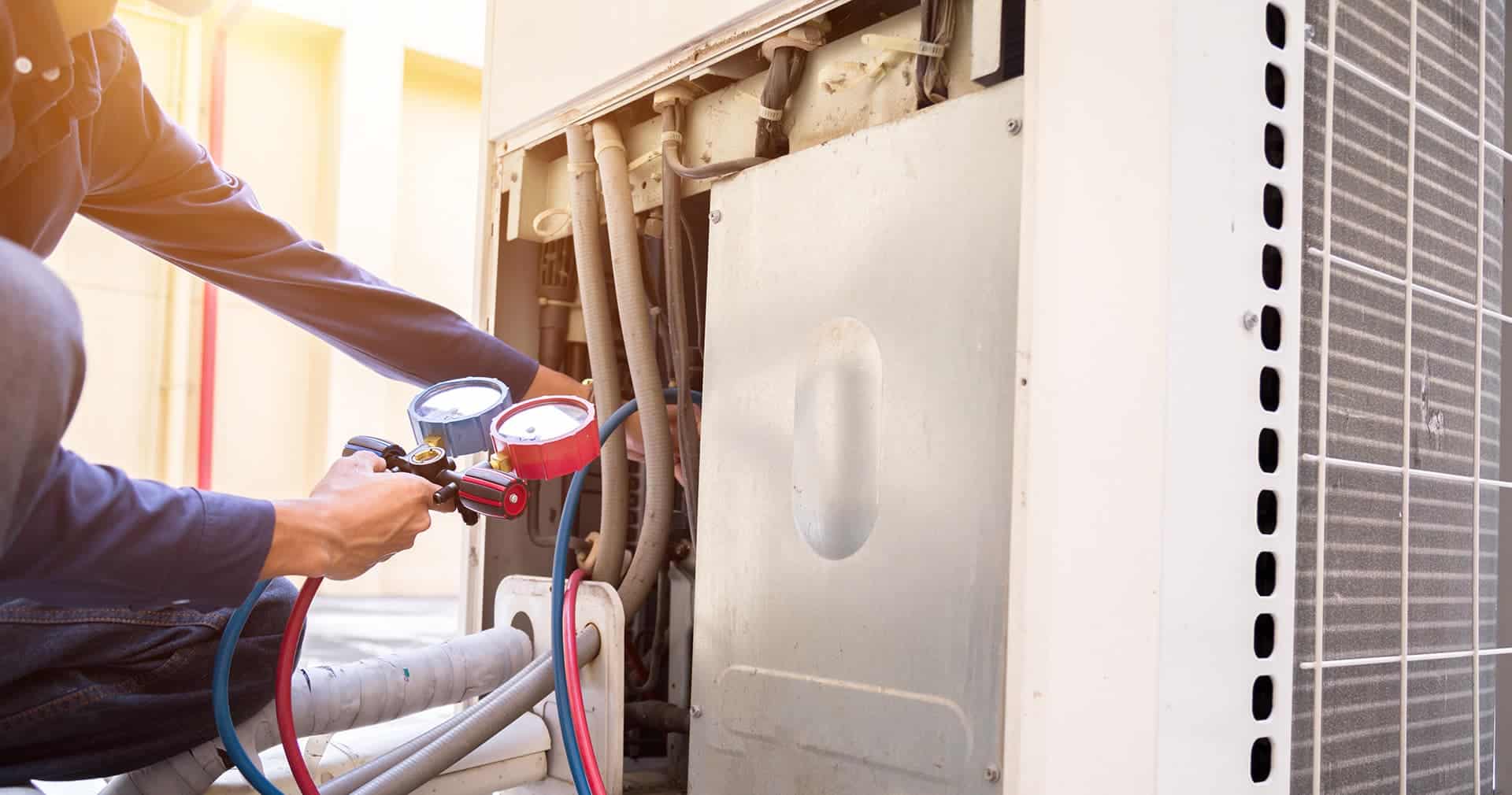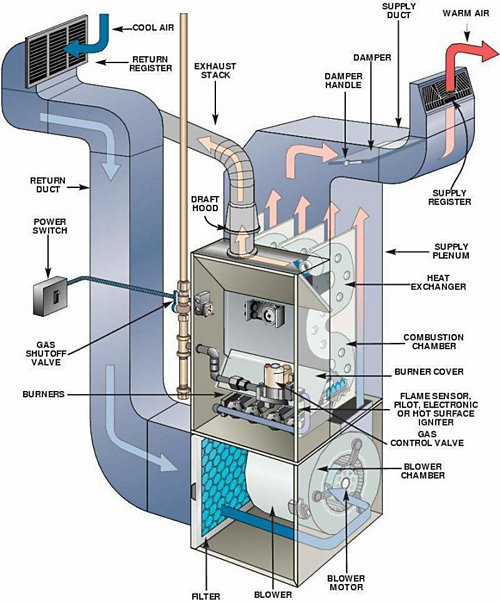Explore how HVAC experts provide same-day service options
Wiki Article
Understanding the Various Kinds Of HVAC System for Ideal Performance
Understanding the numerous kinds of cooling and heating systems is important for property owners aiming to improve convenience and energy effectiveness. Central air conditioning systems give uniform temperature control, while ductless mini-split systems provide adaptability. Heatpump deliver effective year-round environment monitoring. For smaller rooms, home window and portable a/c unit work as functional services. Geothermal systems make use of regular below ground temperature levels for lasting home heating and cooling. Each alternative holds distinct benefits, prompting a more detailed evaluation of which might match individual needs best.Central Air Equipments
Lots of home owners look for means to improve interior convenience, understanding main air conditioning systems is vital for efficient climate control. Central air conditioning runs by circulating trendy air through a system of ducts, distributing it equally throughout the home. This kind of system contains a number of key components, consisting of an outside compressor, an indoor evaporator coil, and a network of ductwork.The compressor cools refrigerant, which then absorbs warmth from indoor air as it goes through the evaporator coil. This cooled down air is pushed via the ducts and right into living rooms, assuring a regular temperature. Central air conditioning systems are known for their efficiency, often using programmable thermostats to maximize power use. Normal upkeep, such as filter adjustments and system checks, is important to ensure durability and performance. Understanding these components aids home owners make notified decisions regarding setup and maintenance, inevitably boosting convenience and energy performance in their homes.
Ductless Mini-Split Systems
Ductless mini-split systems supply a flexible alternative to typical air conditioning, catering to property owners seeking reliable environment control without the requirement for extensive ductwork. These systems contain an exterior compressor device and one or more interior air-handling systems, enabling targeted cooling and home heating in details locations or rooms. This zoning ability enhances convenience by making it possible for individuals to adjust temperature levels based on individual preferences, inevitably bring about energy financial savings.Setup is generally less complex and much less intrusive contrasted to ducted systems, which can be advantageous for older homes or rooms with minimal structural adjustments. Furthermore, ductless mini-split systems frequently include energy-efficient technologies, such as inverter-driven compressors, which optimize power intake based upon demand. Their small design additionally permits various positioning options, making them excellent for non-traditional or tight rooms. As a result, ductless mini-split systems have obtained popularity among house owners searching for contemporary, reliable cooling and heating remedies.
Heat Pumps
Heat pumps represent a flexible and energy-efficient option for both heating and cooling down property rooms. These systems operate by transferring warmth rather than generating it, making them especially effective in moderate environments. Throughout warmer months, warm pumps draw out warm from indoors and release it outside, giving air conditioning. On the other hand, in winter season, they reverse this process, attracting warmth from the see here now outdoors air or ground to warm up the inside.There are 2 main kinds of heatpump: air-source and ground-source (or geothermal) Air-source heatpump are extra typical because of their easier setup and reduced first expense, while ground-source designs boast higher effectiveness and stability in efficiency. Furthermore, heatpump can especially lower power bills and carbon impacts when compared to typical home heating approaches, making them an environmentally friendly choice. On the whole, heatpump stand as an engaging solution for homeowners looking for efficient climate control throughout the year.
Window and Portable Air Conditioners

On the various other hand, portable a/c unit offer adaptability, as they can be quickly moved from space to space. These devices normally require a venting package to tire hot air via a home window, yet they give a convenient alternative for temporary cooling needs.
Both sorts of a/c unit appropriate for tenants and those seeking to prevent comprehensive installment procedures. Customers should consider factors such as BTU ability, power effectiveness scores, and noise degrees when picking a system to guarantee peak performance for their particular area and cooling needs.
Geothermal Cooling And Heating Systems
As power performance comes to be significantly vital, geothermal cooling and heating systems have gained popularity for their sustainable approach to climate control. These systems utilize the secure temperatures found underground to provide heating in winter season and cooling in summertime. By using the earth's all-natural thermal energy, geothermal systems considerably decrease reliance on nonrenewable fuel sources and reduced utility prices.
Geothermal systems normally require less maintenance contrasted to traditional A/c systems, resulting in long-term financial savings. With enhancing understanding of environment adjustment, these systems represent a forward-thinking option for those looking for green and reliable home heating and cooling down options
Regularly Asked Inquiries
Exactly how Frequently Should I Solution My A/c System?
visit this page HVAC systems must preferably be serviced two times a year, as soon as in the spring and once in the loss. Regular maintenance aids assure efficiency, lengthens lifespan, and protects against pricey malfunctions during peak usage seasons.What Size A/c System Do I Required for My Home?
Figuring out the appropriate dimension for a cooling and heating system requires computing the home's square footage, insulation top quality, and environment. More hints An expert evaluation assurances maximum efficiency, convenience, and energy financial savings tailored to the details needs of the residence.Can I Mount an A/c System Myself?
Setting up an a/c system independently is feasible, but it requires technical knowledge and skills. Mistakes can cause inadequacy or safety and security threats, so getting in touch with a specialist is typically suggested to assure appropriate installation and compliance with guidelines.What Are the Indicators My HVAC System Requirements Repair?
Signs that an a/c system needs repair service consist of uncommon noises, inconsistent temperatures, enhanced energy costs, undesirable odors, and constant biking. Motivate focus to these signs can stop further damage and guarantee peak system efficiency.How Can I Improve My HVAC System's Power Performance?
To improve cooling and heating power effectiveness, one should on a regular basis replace filters, seal air ducts, mount a programmable thermostat, guarantee proper insulation, and timetable routine maintenance checks. HVAC experts. These actions collectively enhance performance while decreasing power usage and costsCentral air conditioning systems offer uniform temperature level control, while ductless mini-split systems offer flexibility. Central air conditioning runs by distributing trendy air via a system of air ducts, dispersing it evenly throughout the home. Central air conditioning systems are known for their performance, typically using programmable thermostats to optimize power usage. Ductless mini-split systems offer an adaptable choice to typical central air conditioning, providing to homeowners seeking reliable climate control without the requirement for comprehensive ductwork. Geothermal systems commonly call for less maintenance compared to standard Cooling and heating systems, resulting in long-lasting savings.
Report this wiki page